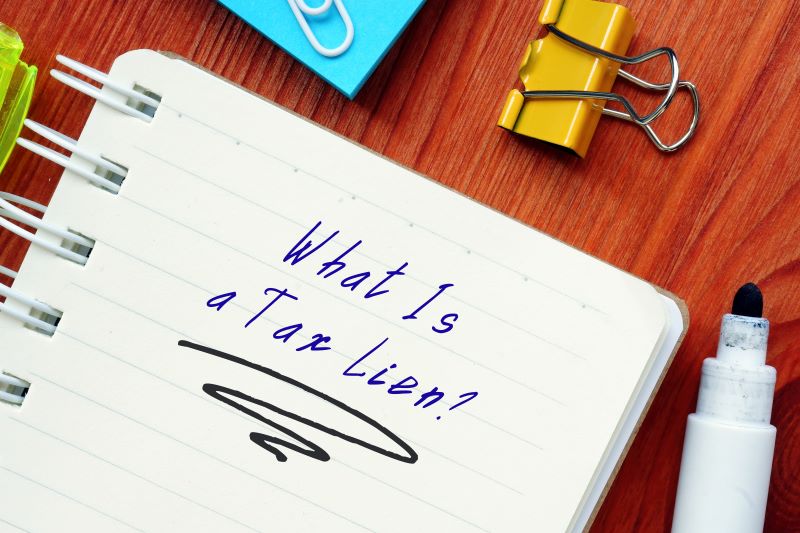What is a Tax Lien and Can It Affect My Credit Score?
Written by Cooper & Friedman PLLC on April 17, 2023

As Tax Day passes and we trek further into the month, there looms in the background an omnipresent uncertainty, because tax season isn’t quite over yet. There’s still the concern that you’ll end up owing more with a late fee if you miscalculated, or perhaps that your return might not be as much as you anticipated.
You might also be worried that one mistake you make while doing taxes will show on your personal financial record for good, because when it comes to financial health and agencies, it would be easy to assume that taxes and personal credit reside in the same sphere and have the ability to affect the other. The good news? They don’t! Not directly, at least.
If you want to know what really happens when you make a mistake on your taxes, check out our blog on the topic!
The one exception to taxes coinciding with your personal credit is a tax lien, because although they cannot directly affect your credit score or be included on your credit report, creditors can still take them into account when deciding if they want to grant your financial request.
What is a Tax Lien?
As defined by the IRS (Internal Revenue Service), a tax lien is, “the government’s legal claim against your [individual or business] property when you neglect or fail to pay a tax debt.” Basically, it’s the first step of a levy – which can be anything from a foreclosure to asset collection – that grants the government first access to assets should a debt remain unpaid. Because there are often other lenders or creditors also looking for the payment of a debt, a tax lien acts as a “first dibs” that has much more legal weight as compared to who gets the front passenger seat on a road trip.
This stamp of the government’s impending access to your assets can encompass to all of the property you own, including:
- Real estate
- Personal Property
- Financial Assets
How Would I Know If I Have a Tax Lien?
A tax lien is not something that should come as a surprise, as three things must happen between the federal government and an individual or business before the lien is issued.
- The IRS must put your balance due on the books to assess your liability.
- The IRS must send you a full bill containing how much you owe, which serves as a notice and demand for payment.
- Throughout the process of lien issue, the IRS will likely send you at least two notices:
- Notice of Federal Tax Lien Filing and Your Right to a Hearing
- Final Notice—Notice of Intent to Levy and Notice of Your Right to a Hearing
- Throughout the process of lien issue, the IRS will likely send you at least two notices:
- You must disregard every notice they send and neglect or refuse to pay the debt in full by the deadline set.
If you’re unsure whether or not you have an outstanding tax lien issued against you and your property, then the IRS’s Centralized Lien Operation number to verify a lien, request lien payoff amount, or release a lien is 800-913-6050.
How Would a Tax Lien Affect My Credit Score?
When it comes to credit reports, which lenders often look at to assess loan risk, the Consumer Financial Protection Bureau (CFPB) removed tax liens from existing on credit reports in April of 2018 – that means you have a right under the Fair Credit Reporting Act to get mistakes like existing tax liens taken off of your credit report. Based solely on your consumer report, the liens wouldn’t be a negative mark on your financial history because they aren’t allowed to be there, but this doesn’t mean that they are totally inaccessible for those who dig deeper and do a more thorough financial background check.
Although tax liens are no longer included in credit reports, they are on file with your local government as public record. This can make getting a personal loan, credit card, car loan, or mortgage more difficult.
Call Cooper and Friedman for Unfair Debt Collection or Credit Reporting
If you’ve received your credit report and notice an unresolved or previous tax lien, you have the right to have it removed as part of fair credit reporting practices.
If you or someone you love has been the victim of unfair credit reporting in the State of Kentucky and are in need of an experienced debt collection attorney, give the lawyers at the Cooper & Friedman law firm a call. The attorneys at Cooper and Friedman PLLC have over 50 years of combined experience defending the rights of unfair credit reporting victims. Contact us with questions you might have or schedule a free case consultation with an attorney by calling 502-459-7555 today.

